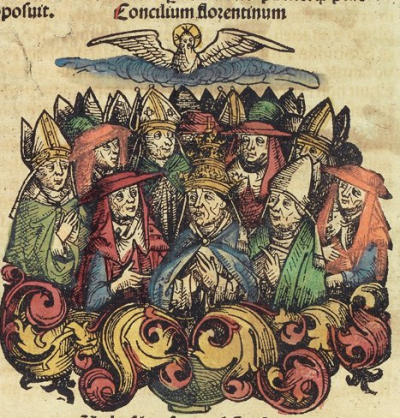Pope Eugene IV (Latin: Eugenius IV; Italian: Eugenio IV; 1383 23 February 1447), born Gabriele Condulmer, was head of the Catholic Church and ruler of the Papal States from 3 March 1431 to his death. Condulmer was a Venetian, and a nephew of Pope Gregory XII. In 1431, he was elected pope. His tenure was marked by conflict first with the Colonnas, relatives of his predecessor Martin V, and later with the Conciliar movement. In 1434, due to a complaint by Fernando Calvetos, bishop of the Canary Islands, Eugene IV issued the bull "Creator Omnium", rescinding any recognition of Portugal's right to conquer those islands, still pagan. He excommunicated anyone who enslaved newly converted Christians, the penalty to stand until the captives were restored to their liberty and possessions. In 1443 Eugene decided to take a neutral position on territorial disputes between Portugal and Castile regarding rights claimed along the coast of Africa. He is the last pope to date to take on the pontifical name "Eugene".
The Council of Florence is the seventeenth ecumenical council recognized by the Catholic Church, held between 1431 and 1449. It was convoked as the Council of Basel by Pope Martin V shortly before his death in February 1431 and took place in the context of the Hussite Wars in Bohemia and the rise of the Ottoman Empire. At stake was the greater conflict between the conciliar movement and the principle of papal supremacy.
The Council entered a second phase after Emperor Sigismund's death in 1437. Pope Eugene IV convoked a rival Council of Ferrara on 8 January 1438 and succeeded in drawing some of the Byzantine ambassadors who were in attendance at Basel to Italy. The remaining members of the Council of Basel first suspended him, declared him a heretic, and then in November 1439 elected an antipope, Felix V.
After becoming the Council of Florence (having moved to avoid the plague in Ferrara), the Council concluded in 1445 after negotiating unions with the various eastern churches. This bridging of the Great Schism proved fleeting, but was a political coup for the papacy. In 1447, Sigismund's successor Frederick III commanded the city of Basel to expel the Council of Basel; the rump Council reconvened in Lausanne before dissolving itself in 1449.

 English
English  español
español  français
français  português
português  русский
русский  العربية
العربية  简体中文
简体中文 
